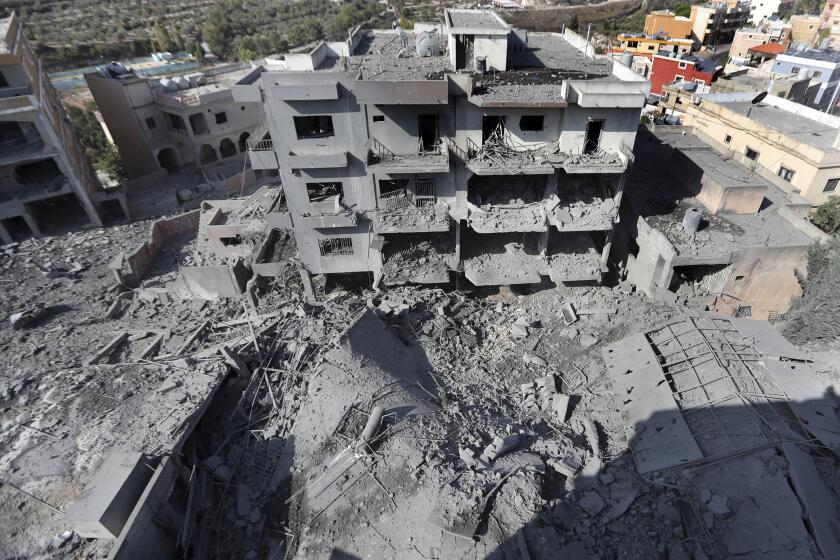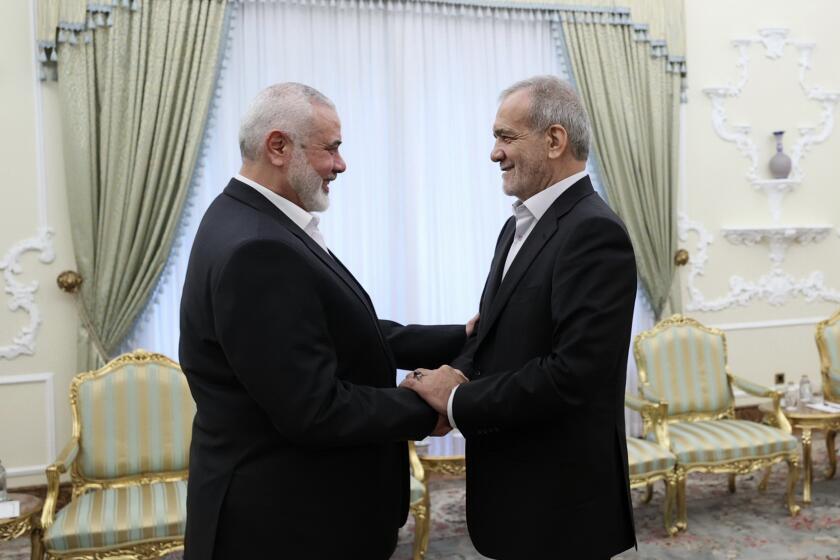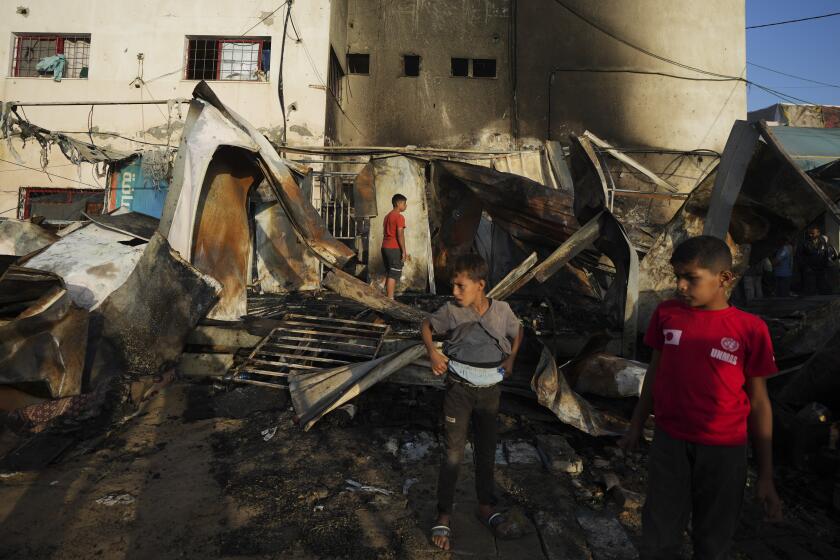A violent end for Hamas leader who plotted Oct. 7 attacks

- Share via
BEIRUT — Yahya Sinwar, the secretive and shadowy alleged mastermind of the Hamas-led onslaught of just over a year ago in southern Israel that triggered a devastating war, was killed by Israeli troops in the Gaza Strip, Israel said Thursday.
Sinwar’s killing in an apparently surprise encounter with Israeli forces marked the end of an intense yearlong hunt by Israeli and American spy agencies for the Hamas leader, who was believed to be hiding in the group’s vast underground network of tunnels in Gaza.
But ultimately, the fatal confrontation caught Sinwar — wiry and silver-bearded, with distinctive dark brows and protruding ears — above ground, in the war-wrecked southern Gaza city of Rafah.
“This is a good day for Israel, for the United States, and for the world,” said President Biden. Vice President Kamala Harris, campaigning for the presidency in the battleground state of Wisconsin, said Sinwar’s death “gives us an opportunity to finally end the war in Gaza.”
Israel accused Sinwar of planning the Oct. 7, 2023, attack in which Hamas-led attackers broke through the Gaza fence and stormed a string of Israeli farming communities and an open-air music festival, killing about 1,200 people and seizing some 250 hostages.
The Israeli military said they were targeting a Hezbollah commander in the strikes late Tuesday on the southern town of Qana.
The remains of the slain militant reportedly underwent DNA testing and were compared with samples of Sinwar’s genetic material collected during his long incarceration in Israeli jails, along with fingerprints and dental records.
There was no immediate comment from Hamas, whose leadership ranks had already been devastated by the July 31 assassination in Tehran of its political leader, Ismail Haniyeh, and by an airstrike in Gaza that killed Sinwar’s top deputy, Mohammed Deif.
Some expressed hopes that Sinwar’s demise could provide an opening for a negotiated end to the war in Gaza, which has killed about 42,000 Palestinians, according to local health officials, triggered an enormous humanitarian crisis and left much of the seaside territory in ruins.
But Israeli Prime Minister Benjamin Netanyahu — who called upon Hamas militants to lay down their weapons and free remaining hostages — notably gave no hint Sinwar’s killing would signal an end to the conflict. Hamas, he said, had “suffered a harsh blow, but we have not finished our task.”
While Israel has come under overwhelming international condemnation for civilian suffering, including accusations of war crimes, U.S. and Israeli officials held Sinwar largely responsible for bringing death and destruction on Palestinians and thwarting a cease-fire and hostage-release deal.
“He treated his own people, the Palestinians of Gaza, as if they were all ready to be martyrs — only he never asked them if they wanted to be martyrs,” veteran Middle East diplomat Dennis Ross said on the social media platform X. “With the Hamas leaders in Gaza gone, Israel should say it will end the war, provided the hostages are released.”
In central Tel Aviv, right-wing Israeli activists were handing out sweets as a form of public celebration.
Many families of remaining Israeli hostages have been highly critical of Netanyahu’s approach to negotiations, and some of them said Sinwar’s death marked an urgent juncture in efforts to secure their loved ones’ freedom.
Hamas leader Ismail Haniyeh was assassinated in Iran after attending the inauguration of the country’s new president, Iran and the militant group said early Wednesday. Hamas blamed an Israeli airstrike.
Orna Neutra, whose dual U.S.-Israeli son Omer is being held, called the news a “critical, time-sensitive development,” and urged both the U.S. and Israeli governments to act quickly to secure a deal. The lives of the hostages, she said in a statement, “are in great danger now, more than ever.”
The Israeli military and the Shin Bet security agency — which first announced Sinwar’s suspected death in midafternoon local time and confirmed it several hours later — said there was no sign that any Israeli hostages were in the area at the time of his killing.
For months, Israeli officials had believed him to be keeping captives close to him as human shields. Of the hostages captured in southern Israel, fewer than 70 are thought to remain alive in Gaza.
In the West Bank, especially in Palestinian communities hit hardest by repeated Israeli military incursions this year, Sinwar was eulogized in mosques, and on the messaging app Telegram, Palestinian activists posted paeans to the slain Hamas leader, portraying him as a hero and fighter.
In Gaza, the reaction was more complicated. An engineer named Nader, who wanted only his first name used for fear of reprisal, said sentiment among those he knew was divided.
“Those gloating [over the leader’s death] say he’s the reason for the war … that he destroyed our homes and we’re living in tents now because of him,” he said. Others, he said, saw Sinwar as a leader who “brought our cause back to the world.”
Some of those affected most directly by the Oct. 7 attacks expressed similar sentiments. Michael Bar-Sinai, 48, whose father Yoram was killed that day, said the U.S. and other Western governments should exert pressure on Netanyahu to reach a negotiated accord.
In the latest dispute, Israel tells U.N. peacekeepers to leave southern Lebanon to avoid being attacked.
“This is a good opportunity to end the war now,” he said by phone from Kibbutz Beeri, which was one of the communities attacked.
In the view of some analysts, Sinwar’s death, dramatic and shocking as it seemed, probably does not represent a fatal blow to Hamas and the ideology that underpins it.
“Killing leaders of a large insurgent-terrorist group does not make the group disappear,” said Mark Cancian, a retired Marine colonel and senior advisor to the security program at the Center for Strategic and International Studies think tank. “There is always a subordinate willing to step up. However, there are damaging near- and mid-term effects ... as the new leader establishes control over the organization.”
U.S. intelligence officials had been working closely with Israel to locate Sinwar as well as hostages. But there was no immediate indication that U.S. information led to his killing, the State Department said.
Sinwar, born in 1962, was a native of the Khan Yunis refugee camp in Gaza. His involvement with Hamas dated to the late 1980s, soon after the militant group was first formed. He made his name in the organization as a brutal internal enforcer, rooting out suspected spies and collaborators with Israel.
Sentenced in 1989 to four life sentences for the abduction and killing of two Israeli soldiers and a number of Palestinians he suspected of collaboration, Sinwar served 22 years in Israeli prison.
In prison, Sinwar became fluent in Hebrew and proved an astute observer of Israeli politics. He survived a bout with brain cancer — his symptoms first spotted by a prison dentist, with his subsequent successful treatment carried out in Israel.
His jailhouse interrogators — interviewed often in Israeli media about their experiences with him — described a figure who was intellectually curious, utterly ruthless and unyielding in his belief that Israel must be destroyed.
He was released in a lopsided 2011 prisoner exchange, in which 1,000 Palestinians were freed from Israeli jails in exchange for a single Israeli soldier who had been captured and held in Gaza.
In a rare, direct threat, Biden administration says Israel has 30 days to step up deliveries of food, medicine as Gaza faces massive starvation.
That Sinwar survived this long was a source of huge frustration for Israel, whose intelligence services in the past have proved lethally adept at targeting other leaders of Hamas and other Iranian-backed proxy groups such as Hezbollah.
Sinwar proved prescient in his mistrust of any electronic devices — which were used as a devastating weapon last month against operatives of Hezbollah.
The Hamas leader relied instead on a tight and secretive network of couriers who hand-relayed messages to him, and conveyed his responses.
While that clandestine mode of communication undoubtedly helped keep Sinwar alive over the months of intense Israeli attacks on Gaza, it also built long delays into negotiations taking place over a number of months, when the United States, intermediaries such as Egypt and Qatar, as well as Sinwar’s own allies, awaited his response.
At least one group of hostages had a startling encounter with Sinwar early in their captivity.
A former hostage named Margalit Mozes — released in November 2023 as part of a temporary cease-fire and hostage-prisoner exchange — described the Hamas chief’s unexpected entry, with an entourage, to a section of tunnels where she was being held. She recognized him immediately, Mozes said, and he acknowledged his identity, addressing her in fluent Hebrew.
Mozes, who was 77 at the time, said she demanded to know the point of seizing her and other civilians, especially elderly people, from Israeli communities near Gaza that were attacked. She told Israeli news outlets that Sinwar confidently informed her that there was no reason to be afraid, and that the hostages were only to be used as bargaining chips.
One stint of Sinwar’s lengthy imprisonment took place in Ashkelon, an Israeli town just outside Gaza where Sinwar’s parents had lived before being forced to flee their home in the aftermath of Israel’s war of independence in 1948.
Accounts from those who interacted with him during that time said he liked to go barefoot when allowed out into the prison yard, saying he wanted his feet to touch the ground of what he called his rightful homeland.
Staff writer Bulos reported from Beirut, and staff writers Wilkinson and King from Washington. Special correspondent Dina Kraft contributed reporting from Tel Aviv.
More to Read
Sign up for Essential California
The most important California stories and recommendations in your inbox every morning.
You may occasionally receive promotional content from the Los Angeles Times.



















